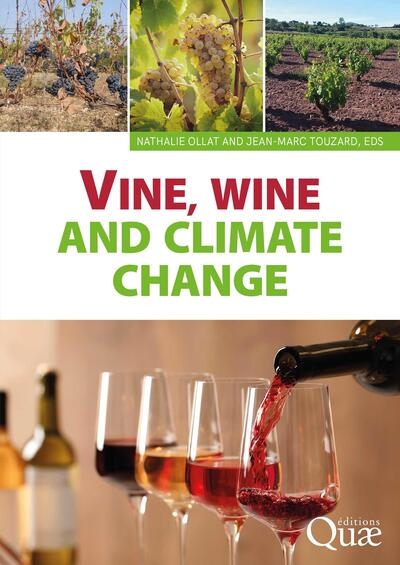en savoir plus

Carte fidélité
Permet à tous ses détenteurs d'obtenir 5% de réduction sur tous les livres lors du retrait en magasin (réduction non cumulable avec les réductions de type étudiant).
Offre également un certain nombre d'avantages auprès de nos partenaires.
Wishlist
Avec les favoris, retrouvez dans un espace les sélections effectuées au fur et à mesure de vos navigations dans le site.
Constituez pour votre usage personnel vos listes de livres en prévisions d'achats futurs et votre sélection d'articles, dossiers, événements, vidéos ou podcasts préférés ou à découvrir plus tard...
Il suffit simplement de cliquer sur "Ajout Favori" sur chaque page qui vous intéresse pour les retrouver ensuite dans votre espace personnel.
Requiert un compte Mollat
Mes Alertes
Requiert un compte Mollat
Vine, wine and climate change
en savoir plus
Résumé
Une vision globale des impacts du changement climatique sur la vigne et le vin ainsi qu'une exploration des différentes pistes d'adaptation pour la filière. ©Electre 2025
Lire la Quatrième de couverture
Réduire la Quatrième de couverture
Grapevine is being affected by climate change in many ways, from earlier plant development - which could make vines more vulnerable to spring frosts - to earlier grape ripening.
Increasingly intense extreme weather events, such as heat waves and torrential rain, are also causing major damage to vines. Water stress, which is more pronounced in southern France, has a marked effect on yields. All French vineyards must contend with these issues. Wine characteristics are also changing, with higher alcohol levels, lower acidity and different aromas becoming more common. Meanwhile, new areas are becoming suitable for winegrowing.
The key to addressing these issues is to adapt faster. But how exactly should we do this ? What decisions at the local or national level should be taken ?
After ten years of research into adapting the French vine and wine industry to climate change, the LACCAVE project, led by INRAE, came to an end in 2021. This book summarizes the results of that project and explores possible levers for action, including new grape varieties ; improved soil, water and training system management ; reorganization of winegrowing areas ; oenological innovations ; and new regulations. Readers will find a systemic and strategic vision showing how these actions can be implemented through participatory approaches at different levels, from winegrowers to the winegrowing sector's own climate policy.
This reference book is aimed primarily at industry professionals, lecturers and students.
The French version of this book received the 2024 OIV Award from the International Organisation of Vine and Wine for the Sustainable Viticulture category.
Fiche Technique
Paru le : 25/01/2025
Thématique : Viticulture
Auteur(s) : Non précisé.
Éditeur(s) :
Quae
Collection(s) : Non précisé.
Contributeur(s) : Directeur de publication : Nathalie Ollat - Directeur de publication : Jean-Marc Touzard - Préfacier : Hans Reiner Schultz
Série(s) : Non précisé.
ISBN : 978-2-7592-4032-6
EAN13 : 9782759240326
Reliure : Broché
Pages : 265
Hauteur: 25.0 cm / Largeur 18.0 cm
Épaisseur: 1.5 cm
Poids: 624 g
